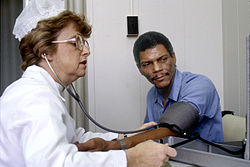Nursing is a health care profession that "integrates the art and science of caring and focuses on the protection, promotion, and optimization of health and human functioning; prevention of illness and injury; facilitation of healing; and alleviation of suffering through compassionate presence".[1] Nurses practice in many specialties with varying levels of certification and responsibility. Nurses comprise the largest component of most healthcare environments.[2][3] Shortages of qualified nurses are found in many countries.[4]
Nurses develop a plan of care, working collaboratively with physicians, therapists, patients, patients' families, and other team members that focuses on treating illness to improve quality of life.
In the United Kingdom and the United States, clinical nurse specialists and nurse practitioners, diagnose health problems and prescribe the correct medications and other therapies, depending on regulations that vary by state.[5] Nurses may help coordinate care performed by other providers or act independently as nursing professionals. In addition to providing care and support, nurses educate the public and promote health and wellness.[6]
In the U.S., nurse practitioners are nurses with a graduate degree in advanced practice nursing, and are permitted to prescribe medications. They practice independently in a variety of settings in more than half of the United States. In the postwar period, nurse education has diversified, awarding advanced and specialized credentials, and many traditional regulations and roles are changing.[7][8]
- ^ Association, American Nurses (30 May 2021). Nursing: Scope and Standards of Practice. American Nurses Association. ISBN 978-0-9993088-6-8.
- ^ Maymoun, Nazneen; Sohail, M. Sadiq (2020). "Who Wants to be a Nurse? Understanding Emirati Female Students' Knowledge and Attitudes About Nursing as a Career". Nursing Education Perspectives. 41 (3): E14–E19. doi:10.1097/01.NEP.0000000000000659. PMID 32310910. S2CID 216046198.
- ^ Fort, Alfredo L.; Deussom, Rachel; Burlew, Randi; Gilroy, Kate; Nelson, David (2017). "The Human Resources for Health Effort Index: A tool to assess and inform Strategic Health Workforce Investments". Human Resources for Health. 15 (1): 47. doi:10.1186/s12960-017-0223-2. PMC 5518138. PMID 28724381.
- ^ Haczyński, Józef; Skrzypczak, Zofia; Winter, Małgorzata (2017). "Nurses in Poland — Immediate Action Needed". Engineering Management in Production and Services. 9 (2): 97–104. doi:10.1515/emj-2017-0019.
- ^ "Nursing | The SAGE Encyclopedia of Economics and Society". search.credoreference.com. Retrieved 18 February 2022.
- ^ Freeman, Veronica. "The role of nurses in our society today". www.cerner.com. Retrieved 31 March 2023.
- ^ Coulehan J. L., Block M. R. (2005): The Medical Interview: Mastering skills for clinical practice, 5th Ed. F. A. Davis. ISBN 0-8036-1246-X. OCLC 232304023.
- ^ Dunphy L. M., Winland-Brown J. E. (2011): Primary care: The art and science of advanced practice nursing. F.A. Davis. ISBN 9780803626478.
